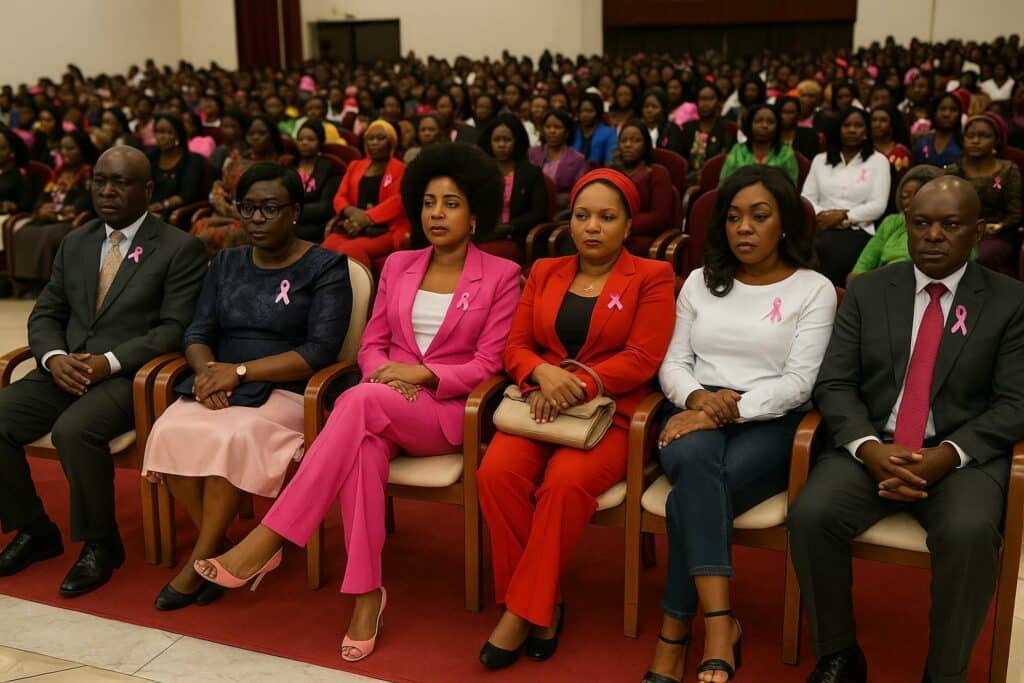A master class that resonated beyond the hall
The solemn rotunda of the Pierre-Savorgnan-de-Brazza Memorial rarely hosts events that blend medical urgency with collective emotion. Yet on 23 October, its walls echoed with testimonies, scientific updates and a resolute pledge: to curb the rising tide of breast and cervical cancer in the Republic of Congo. Convened by the Tabita Allegresse Foundation, the master class drew physicians, officials, United Nations specialists and community advocates, all determined to transform awareness into structured action.
From personal loss to public mission
For Lydie Léonce Ndongo, president of the foundation, the struggle is deeply intimate. She created the organisation after pancreatic cancer claimed her mother, Tabita Allegresse Mokana Ndongo, in 2017. “No woman, no family should endure alone what we experienced,” she told the audience, her voice steady yet charged with remembrance. That private tragedy now informs a nationwide campaign that privileges early detection, culturally adapted education and pro-poor access to treatment.
Government leadership and UNFPA technical leverage
The event offered a vivid illustration of what multi-actor coordination can achieve when public health ranks high on the national agenda. François Lebama, representing the Ministry of Health and Population, reaffirmed that the Strategic National Plan to Fight Cancer 2022-2026 positions breast and cervical tumours among its prime targets, in line with the Sustainable Development Goals. Bruno Bilombo, speaking for the UN Population Fund, emphasised that his agency has already provided updated national guidelines for the detection and management of common cancers. Those documents, he argued, now serve as “the compass that guides health professionals toward standardised, quality care across the territory.” The convergence between governmental vision, normative UN frameworks and civil-society energy is emerging as a comparative advantage for Congo in the regional fight against women’s cancers.
The memorial’s symbolic added value
Hosting the master class at the Pierre-Savorgnan-de-Brazza Memorial was not merely a logistical choice. Its director, Bélinda Ayessa, reminded attendees that a site dedicated to memory must also protect the living. “We honour the builders of yesterday, but we also have the duty to safeguard today’s lives and enlighten tomorrow’s consciences,” she observed. By opening its doors during October Rose, the global breast-cancer awareness month, the institution anchored health advocacy in a space normally devoted to national heritage, thereby broadening the societal resonance of the initiative.
An epidemiological picture that demands urgency
Official registries recorded 2 727 new cancer cases in 2022, with 1 732 deaths. Epidemiologists link the steady climb to population ageing, lifestyle shifts—increased tobacco and alcohol use—and a still-fragmentary screening infrastructure. Late diagnosis remains the norm, notably outside Brazzaville and Pointe-Noire, where specialised services are scarce. Health economists warn that delayed care inflates household costs and strains public finances, turning a medical condition into a socioeconomic burden.
Financing the battle: legal and economic dimensions
The foundation’s plea for corporate and institutional backing is framed not as charity but as a strategic investment. “Cancer is a human, social and economic challenge,” Ndongo insisted. Domestic companies, she argued, stand to benefit from a healthier female workforce and from the reputational gains associated with corporate social responsibility. Under Congolese law, donations to accredited health foundations qualify for tax deductions, creating an incentive architecture that blends altruism with balance-sheet advantage.
Toward a culture of systematic screening
Speakers repeatedly underlined that technical protocols will matter little unless women feel safe, informed and able to access services without prohibitive costs. The Ministry of Health plans to integrate visual inspection with acetic acid for cervical pre-cancers and subsidised mammography days in district hospitals. Meanwhile, the UNFPA has pledged additional training modules to upgrade diagnostic skills among midwives and general practitioners, thereby decentralising expertise.
Collective momentum and cautious optimism
By the session’s close, the master class had morphed into a de facto coalition platform. Memoranda of intent circulated, contact lists expanded, and a calendar of outreach caravans through semi-urban districts took shape. Challenges remain—limited radiotherapy units, uneven drug supply, and the perennial tension between urban and rural service coverage. Yet the atmosphere was neither fatalistic nor confrontational. Instead, it reflected a measured confidence that, underpinned by government stewardship and reinforced by partners, Congo can bend the cancer curve.

